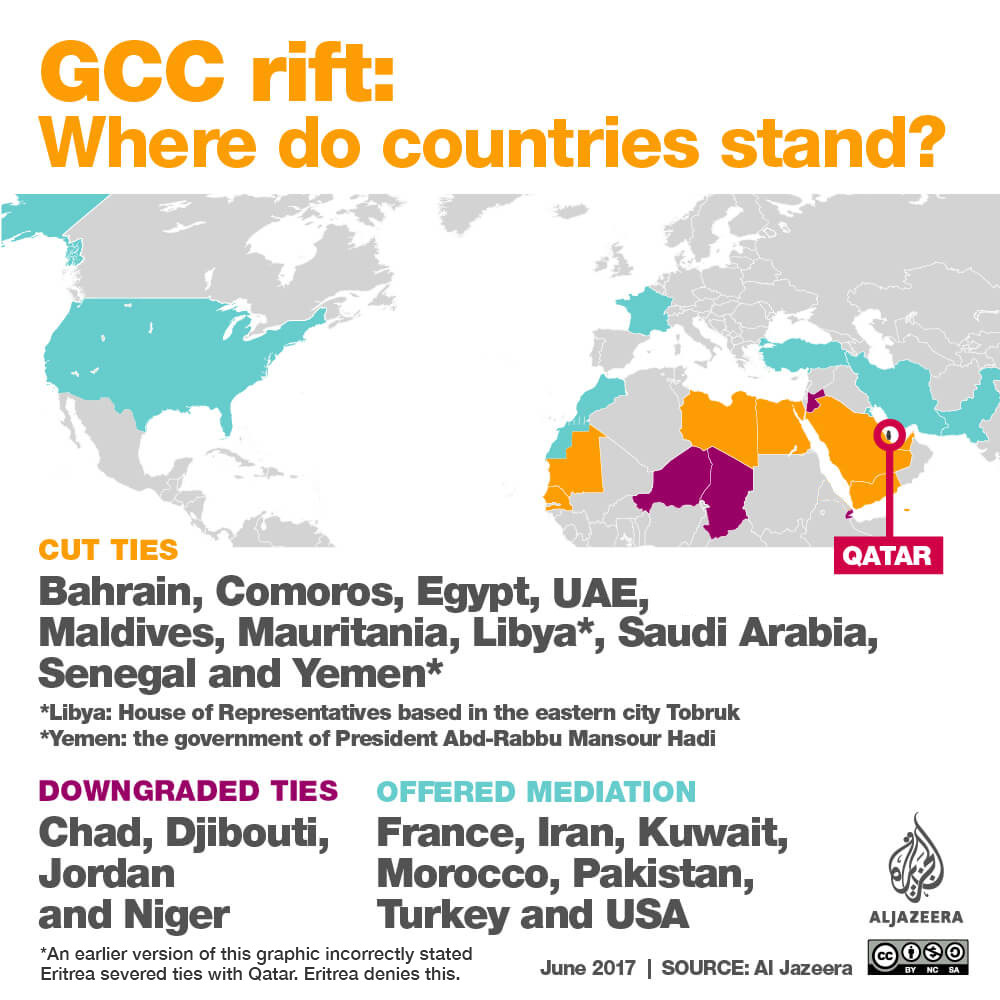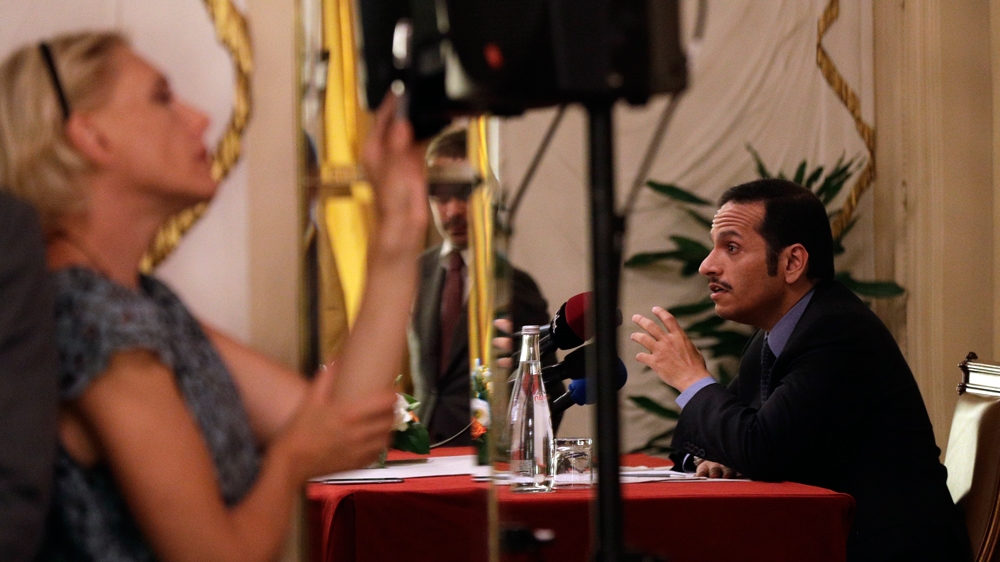SECRETS OF THE RIFT BETWEEN QATAR AND SAUDI ARABIA
Each time I write, I have in my mind those who are capable of independent thinking, because they are the only ones addressed by Allah in the holy Qur’an. They belong to the only set of humans who can comprehend the language of logic and revelations. It’s however pathetic that we now live in a clime where an alternative view is a crime. Thus, I cannot count the number of friends who have called to harass and also declare me a renegade on account of my blunt critique of the Saudi royals.
I make bold to say here today that the Saudi kingdom is the best place to live on earth, and its citizens are kind-hearted Muslims, arguably the best I have encountered in the course of my global itinerary. But the policy of its government constitutes a great jeopardy to the future of the global Muslim Ummah. I am afraid, the security of our two holy shrines in Makkah and Madina seems to fall in doubt, with the kingdom’s continued habit of trusting the state of Israel and her age-long ally, the United States of America. We pray against a probable usurpation of the two holy houses. For the past 70 years, we are yet to dry our tears for the loss of Aqsa!
Ladies and gentle men, I do not hate the kingdom of Saudi Arabia, I re-affirmed; and in fact, the best scholars in the Muslim world today are, arguably, products of the kingdom’s citadel. However, this raging issue is not one that is open to all scholars and students of students, for it’s neither of Fiqh nor Usuul Din. It’s of course a terrain of Muslim experts in the field, who have been following the regional politics of the gulf states from inception. So, with your lack of the requisite knowledge, you must be totally mute, whatever your emotional allegiance. It’s not because this sad occurrence is a turmoil, but simply because it’s not the knowledge of Fiqh you brandish with pride!
The Qataris came on board the global relevance just of recent.They are, like the Saudis, Sunni Muslims. However the Al-Thani ruling family of Qatar had descended from a tribe of Bedouins who fought the Al-Saud family well before the Lawrence of Arabia made the Al-Saud family the rulers of Mecca, and then promptly crashed his motorcycle. My 2001 book, BULLETS, BLOOD AND TEARS (The Arab-Israeli Encounter in Palestine) discusses the event of that turbulent era in detail.You can search it out in bookstores.
The ruling class family of Qatar is from Al-Thani dynasty of Banu Tamim clan, one of the most influential Arab tribes of the peninsula. The land space of Qatar was discovered in 1850 or thereabouts. By the time it gained its independence in 1971, Saudi Arabia was already at the height of its oil wealth, prompting the Qataris to cuddle up to the powerful Saudi monarch of that era, King Faisal bin Abdulaziz Al Saud. The later then showered them with so much wealth, political goodwill, advice and competent advisers; and thus, helping the newly urbanized Bedouin Arabs to set up the modern state of Qatar with Saudi funds, not minding the past feud with the Bedouins.
Thus, predictably, the newly emerging Arab nation became politically subservient to its economic benefactor right from independence. However, immediately after its discovery of huge gas reserves in 1990s, her political subservience to Saudi Arabia gradually waned with time. The Qatari government was no longer in need of Saudi money, as they started to chart their own course, often times without consulting Riyadh. They felt so economically independent and formidable in the gulf that they could now project their own country in the image of modernity, bidding for the FIFA World Cup in 2022, for example.
The kingdom of Saudi Arabia is not comfortable with Qatar’s audacity, especially in the area of diplomatic manoevouring and loyalty. A one time loyal boy of the gulf whose birth and growth we witnessed, now claiming the right to compete favourably with us, working against our wish and sharing a plate of dry khubz and dates with our enemies. Worse still, this repugnant reign of little Tamim, the leadership of Saudi Arabia had probably mused grudgingly. King Salman bin Abdulaziz Al Saud doesn’t go well with Sheikh Tamim and his father, seeing them as being too overtly ambitious and liberal for his taste.
It is indisputably clear that, since rising to power in 2013 at the age of 36, the Qatari emir, Shaykh Tamim, has tried to interact with King Salman as a political equal, rather than an elderly “uncle,” as Arab custom demands. The king of Saudi Arabia is older than Tamim’s father, and yet the later refused to take his advice on Iran and the Muslim Brotherhood, seeing him as being too old and socially disconnected with the contemporary language of global politics. On several occasions, he had also refused the Saudi’s request to expel Sheikh Yusuf al-Qaradawi, the aged scholar who has been living in Qatar since 1961.
Why breaking ties with Iran if we could have it with the Zionist state of Israel, especially since the bilateral relations with Iran is providing us the necessary growth and a sundry other economic advantages, which is rare with any other country of the Arab world, including Saudi Arabia? That’s probably the thought system of the Qatari administration, which is also shared by its other neighbours – Kuwait and Oman as well as the geographically distant Pakistan.
Oman has always distanced itself from the Saudi bloc. For instance, Sultan Qaboos deliberately avoided the Riyadh summit and his representative did not get a short bilateral meeting with Trump, as did all the other GCC representatives. The country also stayed out of the Saudi war in Yemen and has kept open its ties with Iran. Of course, both Qatar and Oman enjoy the strong economic ties with Iran that constrain their approach to Tehran.
Also, Saudi’s relation with Pakistan has been greatly affected since the breakout of the war in Yemen, which Pakistan decisively refused to join despite repeated diplomatic lobby from Saudi Arabia. The Pakistani parliament even voted overwhelmingly to keep out of the senseless genocide. Pakistan is, indeed, the Muslim world’s biggest military power and the only Muslim country with nuclear weapons. Therefore, it could have nourished the Saudi’s political ego if the Asian country had fallen for the lobby and partaken in the war.
In the final analysis, the main problem lies in Qatar’s sympathy for the Muslim Brotherhood, against Saudi Arabia’s will. Although the Saudis had in the past hosted the movement’s leading figures fleeing Egyptian persecution in the 1950s and 1960s, they soon had them expelled when some Egyptian and Palestinian clerics started criticizing the Saudi government and then publicly condemning its support of the Americans in Operation Desert Storm.
Qatar, however, picked them up — one after the another — using the Muslim Brotherhood movement to increase its leverage in Arab politics and influence the internal affairs of far larger and better-established countries in the Arab world. We may be interested in knowing that the Saudi royals are always agitated at the mention of the Muslim Brotherhood simply because of the later’s influence in the region and its capability to seize power at any slight opportunity – with the level of political awareness, educational qualifications, economic capability, professional sophistication and social exposure of its members, all of which stand the movement out in the Arab world. Hence, the royals guard the throne jealously!
Will Qatar succumb to the pressure and send AlQaradawiy packing? Will it withdraw its support for the Brotherhood movement? Will the state of Qatar adjust the focus of its foreign policy? Alqaradawiy arrived in Doha in 1961 as a fugitive, a year after Ahmad Bn Ali Al-Thani stepped on the throne. He later encountered the heir apparent to the throne of Qatar, Hamad Bn Khaleefah Al-Thani, and became his bosom friend. It was an era of mass persecution of the Brotherhood members in Egypt. He then picked up a career in teaching at the Qatari University’s faculty of Shari’ah. However, a few years after, Hamad Bn Khaleefah Al-Thanni (Qaradhawi’s friend) who had already become the emir after his father’s death was dethroned by his child, Khaleefah Bn Hamad Al-Thani, in June1995, when the later was away in Switzerland, with the support of both Saudi Arabia and the state of Kuwait.
The new emir was initially suspicious of AlQaradawiy, especially when the Shaykh visited his friend in exile. He was then arrested on his return at the airport in Doha. It was at a time when the emir was still subservient to the Saudi government. But after discovering the potential intellectual value of the scholar in question, he reconciled with him and also opened the palace’ gate to his father’s friend. Nevertheless, while in his late 60s in June 2013, Hamad Bn khaleefah Al-Thanni abdicated the throne and honorably stepped down for his 36year old son called Tamim Bn Hamad Al-Thani who by then had become a loyal student of the Shaykh.
Thus, this clearly answers the question of whether the state of Qatar will ever succumb to the demands of the house of Saud. Also, with an insight into the political evolution of this tiny Arab state as well as the kind of relationships which had existed between it and Saudi Arabia – discussed so far, we can now understand what informs the Saudis’ demand for total dismantling of Qatar’s sovereignty through its thirteen points demand and ten day ultimatum.
Abu Mazeedatil Khayr Bn Sa’eed
A summary of his presentation at the monthly discourse of MUSLIM INTELLIGENTSIA CIRCLE (MIC) and then followed by numerous questions and answers on issues around the Muslim world.
Kaduna, Nigeria.
This article contains the author’s opinion and they do not reflect knowislam.com.ng policies.



 Professor
Professor

![Assad appears on Syrian banknote for first time The currency previously only carried images of historic icons or pictures of Assad's late father [Reuters]](https://www.aljazeera.com/mritems/imagecache/mbdxxlarge/mritems/Images/2017/7/3/563c56612bd148629efed919f2d24ded_18.jpg)



